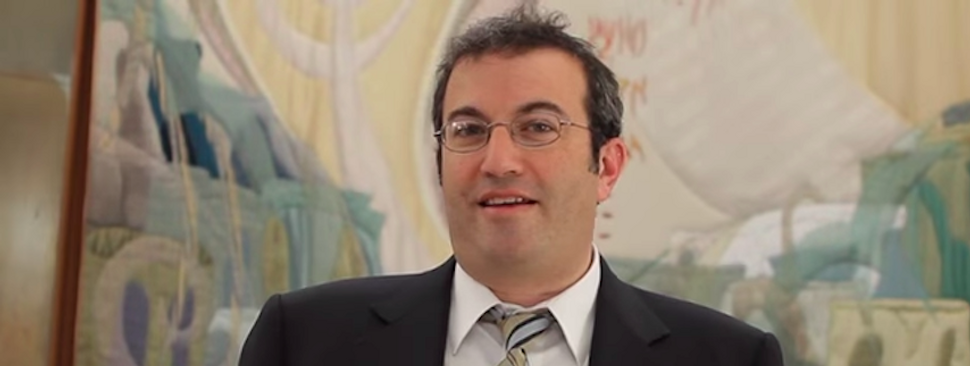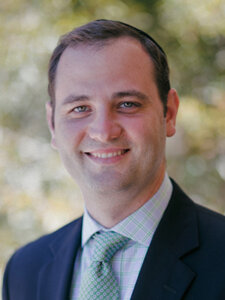Money Smarts Isn’t the Most Important Quality for Yeshiva U.’s Next President

Image by Getty Images
The Jewish community has been abuzz this past week with news that Yeshiva University’s search committee selected Rabbi Ari Berman as its top choice to become Y.U.’s next president. As the committee’s press release noted, Berman has the Modern Orthodox and Y.U. pedigree you would expect of the university’s next leader; he was rabbi of The Jewish Center in New York City — the same rabbinic pedigree of previous Y.U. president Rabbi Norman Lamm — and is also a triple alumnus of Y.U., with degrees from Yeshiva College, Bernard Revel Graduate School of Jewish Studies and RIETS.
However, critics have begun assailing the pick on the grounds that Berman ostensibly lacks the financial acumen to run an institution beset by economic challenges. For example, Bethany Mandel has argued that the prospects for a financial turnaround would be far greater if the next president had an MBA along with experience in financial management. Y.U.’s student newspaper, the Commentator, similarly implied dissatisfaction with Berman’s lack of management experience, describing the search committee’s press release as “charitably referr[ing] to him as [a] CEO.”
This reaction is, of course, not surprising. Y.U. has contended with significant financial challenges in recent years, prompting some to see improved financial management as the panacea for what purportedly ails the institution. But framing the selection of a new president in these terms is a mistake. It amounts to reactionary, instead of forward-looking, decision making. If the world has learned anything about higher education, it is that the answers that might have worked in 2000 are unlikely to be the same answers that work in 2017.
On this count, Y.U.’s objectives going forward seem quite obvious. Like any other business, Y.U. has a brand: It stands as the flagship institution of Modern Orthodoxy. And maintaining this position is essential for Y.U.’s future. Students will continue to enroll and philanthropists will continue to donate only to the extent that its next leader can make the case that Y.U. is the single most important institution to the vitality of Orthodox Judaism. Moody’s, in its now-infamous series of financial evaluations of Y.U., has made this point crystal clear: “Yeshiva’s unique role as a comprehensive university operated under Jewish auspices drives student demand and strong philanthropic support.”
As a result, the most important objective for the next president of Y.U. will be — like it has been for presidents before him — to explain why Y.U. is indeed the flagship institution of Modern Orthodoxy. He will have to explain what exactly Y.U.’s product is and why that product has essential value for its constituents.
As I’ve written in these pages before, Y.U. has all the bones of an effective business plan. When you strip away all the atmospherics, Y.U.’s core product is strong: It continues to produce extraordinary graduates that serve as the engine that drive Modern Orthodoxy. In each Modern Orthodox community, Y.U. graduates are invariably the ones in the schools and synagogues, boardrooms and office buildings. Spending years in the Y.U. environment, they are committed to imagining and building institutions that serve the needs of the Jewish community. And in this way, Y.U.’s product is also essential: Without Y.U. graduates, there simply isn’t the labor force to maintain the institutional infrastructure that makes Modern Orthodox Judaism possible in the United States.
Like presidents before him, the incoming president of Yeshiva University will need to be someone capable of expressing this point, explaining to its core constituencies why Y.U. truly is the flagship institutions of Modern Orthodoxy. This is not to say that business acumen plays no role; it is undoubtedly the case that an MBA or extensive experience in financial management is a plus for any CEO — and surely for the CEO of a complex organization like a university. But a CEO need not be all things — indeed, he cannot be — and that is precisely why any complex organization has a C-suite of executives hired to achieve the wide range of objectives necessary for a business to succeed.
By contrast, Y.U. cannot survive without a CEO that has a deep and sophisticated understanding of its mission. This is something even Moody’s understands; the next leader needs, first and foremost, to understand Y.U.’s product so that he can make its essential value clear to all of its constituencies. Business acumen, while clearly of value, cannot be the tail that wags the dog. To choose otherwise — to look for skills that address past challenges as opposed to future opportunities — is to embrace reactionary, as opposed to transformational, leadership. Leaders can hire financial professionals. A mission-driven message must start from the top down.
In this way, the selection of Berman fits the mold of what the institution needs now. His background evidences a sophisticated understanding of both Modern Orthodoxy and the value of a Y.U. education. He has the education and pedigree to present Y.U.’s brand with all that it has to offer.
But this selection is about more than just Berman. It is about changing how the Orthodox Jewish community thinks about leadership. Building a mission-driven institution requires creativity and innovation — it necessitates a forward-thinking approach. And it demands identifying leaders that can translate how our central institutions promote our essential religious values. The future of our community depends on it.
Michael A. Helfand is an associate professor at Pepperdine University School of Law and a Yeshiva College graduate, Class of 2002.
The Forward is free to read, but it isn’t free to produce

I hope you appreciated this article. Before you go, I’d like to ask you to please support the Forward.
Now more than ever, American Jews need independent news they can trust, with reporting driven by truth, not ideology. We serve you, not any ideological agenda.
At a time when other newsrooms are closing or cutting back, the Forward has removed its paywall and invested additional resources to report on the ground from Israel and around the U.S. on the impact of the war, rising antisemitism and polarized discourse.
This is a great time to support independent Jewish journalism you rely on. Make a gift today!
— Rachel Fishman Feddersen, Publisher and CEO
Support our mission to tell the Jewish story fully and fairly.
Most Popular
- 1

Culture Cardinals are Catholic, not Jewish — so why do they all wear yarmulkes?
- 2

Fast Forward Ye debuts ‘Heil Hitler’ music video that includes a sample of a Hitler speech
- 3

News School Israel trip turns ‘terrifying’ for LA students attacked by Israeli teens
- 4

Fast Forward Student suspended for ‘F— the Jews’ video defends himself on antisemitic podcast
In Case You Missed It
-

Opinion This week proved it: Trump’s approach to antisemitism at Columbia is horribly ineffective
-

Yiddish קאָנצערט לכּבֿוד דעם ייִדישן שרײַבער און רעדאַקטאָר באָריס סאַנדלערConcert honoring Yiddish writer and editor Boris Sandler
דער בעל־שׂימחה האָט יאָרן לאַנג געדינט ווי דער רעדאַקטאָר פֿונעם ייִדישן פֿאָרווערטס.
-

Fast Forward Trump’s new pick for surgeon general blames the Nazis for pesticides on our food
-

Fast Forward Jewish feud over Trump escalates with open letter in The New York Times
-
Shop the Forward Store
100% of profits support our journalism
Republish This Story
Please read before republishing
We’re happy to make this story available to republish for free, unless it originated with JTA, Haaretz or another publication (as indicated on the article) and as long as you follow our guidelines.
You must comply with the following:
- Credit the Forward
- Retain our pixel
- Preserve our canonical link in Google search
- Add a noindex tag in Google search
See our full guidelines for more information, and this guide for detail about canonical URLs.
To republish, copy the HTML by clicking on the yellow button to the right; it includes our tracking pixel, all paragraph styles and hyperlinks, the author byline and credit to the Forward. It does not include images; to avoid copyright violations, you must add them manually, following our guidelines. Please email us at [email protected], subject line “republish,” with any questions or to let us know what stories you’re picking up.















